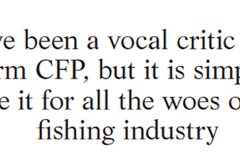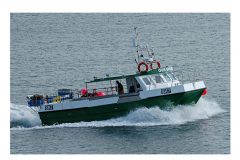The Scottish Maritime Academy (SMA), the nautical arm of North East Scotland College (NESCol) recently ran its first 30-hour diesel engine course for a cohort of 10 skippers and crew from all over Scotland. Following a written assessment, all of the class passed this MCA-approved course with flying colours. The course is funded by Seafish and the Maritime & Coastguard Agency.
Lecturer Willie Morrison said: “Over the five days, the class has gained a good theoretical understanding of diesel engines. This, combined with their existing practical experience, means that they are all better prepared in preventing and responding to engine and machinery failures which may occur at sea.”
The course is a new requirement as part of the Unrestricted Seafish Under 16.5m Skipper’s Certificate.
Skipper of Venture 11 BF 326, Alan Addison from Portsoy, added: “There is a big demand for this type of course, given how buoyant the fishing industry is at the moment and the number of new builds underway. This knowledge will hopefully help prevent unnecessary incidents at sea, helping to improve overall safety.”
Linda Hope, Centre Manager of the Academy, added: “The success of this first course means that we are now running a second, starting on June 20. This will also will be funded by Seafish and the Maritime & Coastguard Agency. Interested skippers and crew should contact me for further details, as certain criteria have to be met.”
Fishermen are encouraged to take advantage of this course in light of the Marine Accident Investigation Branch’s 2012 Annual Report which states that machinery failures account for by far the greatest number of reported accidents concerning fishing vessels. It mentions that fishermen need to develop better knowledge of mechanical issues and maintenance procedures if the level of machinery failures is to be reduced. The report acknowledges that while it can be expensive to service and maintain machinery to ensure in-service reliability, the cost involved in towing or escorting vessels back into port following a breakdown can be significant.
Simon Potten, Head of Safety and Training at Seafish said: “Only commercial fishing vessels with a propulsive power of 750kW and above are required to carry certificated Engineer Officers, but every fishing vessel needs at least one person trained in engine and machinery operation and maintenance. This course is approved by the Maritime and Coastguard Agency as being fit for that purpose.”
The course covers: the compression ignition engine; engine cycles; fuel system; combustion process; cooling system; lubrication system; electrical systems; power transmission and hull fittings.
Further information on the eligibility criteria for this course is available by contacting Linda Hope on: 01779 476204 or by emailing: sma@nescol.ac.uk


The Scottish Maritime Academy (SMA), the nautical arm of North East Scotland College (NESCol) recently ran its first 30-hour diesel engine course for a cohort of 10 skippers and crew from all over Scotland. Following a written assessment, all of the class passed this MCA-approved course with flying colours. The course is funded by Seafish and the Maritime & Coastguard Agency.
Lecturer Willie Morrison said: “Over the five days, the class has gained a good theoretical understanding of diesel engines. This, combined with their existing practical experience, means that they are all better prepared in preventing and responding to engine and machinery failures which may occur at sea.”
The course is a new requirement as part of the Unrestricted Seafish Under 16.5m Skipper’s Certificate.
Skipper of Venture 11 BF 326, Alan Addison from Portsoy, added: “There is a big demand for this type of course, given how buoyant the fishing industry is at the moment and the number of new builds underway. This knowledge will hopefully help prevent unnecessary incidents at sea, helping to improve overall safety.”
Linda Hope, Centre Manager of the Academy, added: “The success of this first course means that we are now running a second, starting on June 20. This will also will be funded by Seafish and the Maritime & Coastguard Agency. Interested skippers and crew should contact me for further details, as certain criteria have to be met.”
Fishermen are encouraged to take advantage of this course in light of the Marine Accident Investigation Branch’s 2012 Annual Report which states that machinery failures account for by far the greatest number of reported accidents concerning fishing vessels. It mentions that fishermen need to develop better knowledge of mechanical issues and maintenance procedures if the level of machinery failures is to be reduced. The report acknowledges that while it can be expensive to service and maintain machinery to ensure in-service reliability, the cost involved in towing or escorting vessels back into port following a breakdown can be significant.
Simon Potten, Head of Safety and Training at Seafish said: “Only commercial fishing vessels with a propulsive power of 750kW and above are required to carry certificated Engineer Officers, but every fishing vessel needs at least one person trained in engine and machinery operation and maintenance. This course is approved by the Maritime and Coastguard Agency as being fit for that purpose.”
The course covers: the compression ignition engine; engine cycles; fuel system; combustion process; cooling system; lubrication system; electrical systems; power transmission and hull fittings.
Further information on the eligibility criteria for this course is available by contacting Linda Hope on: 01779 476204 or by emailing: sma@nescol.ac.uk




